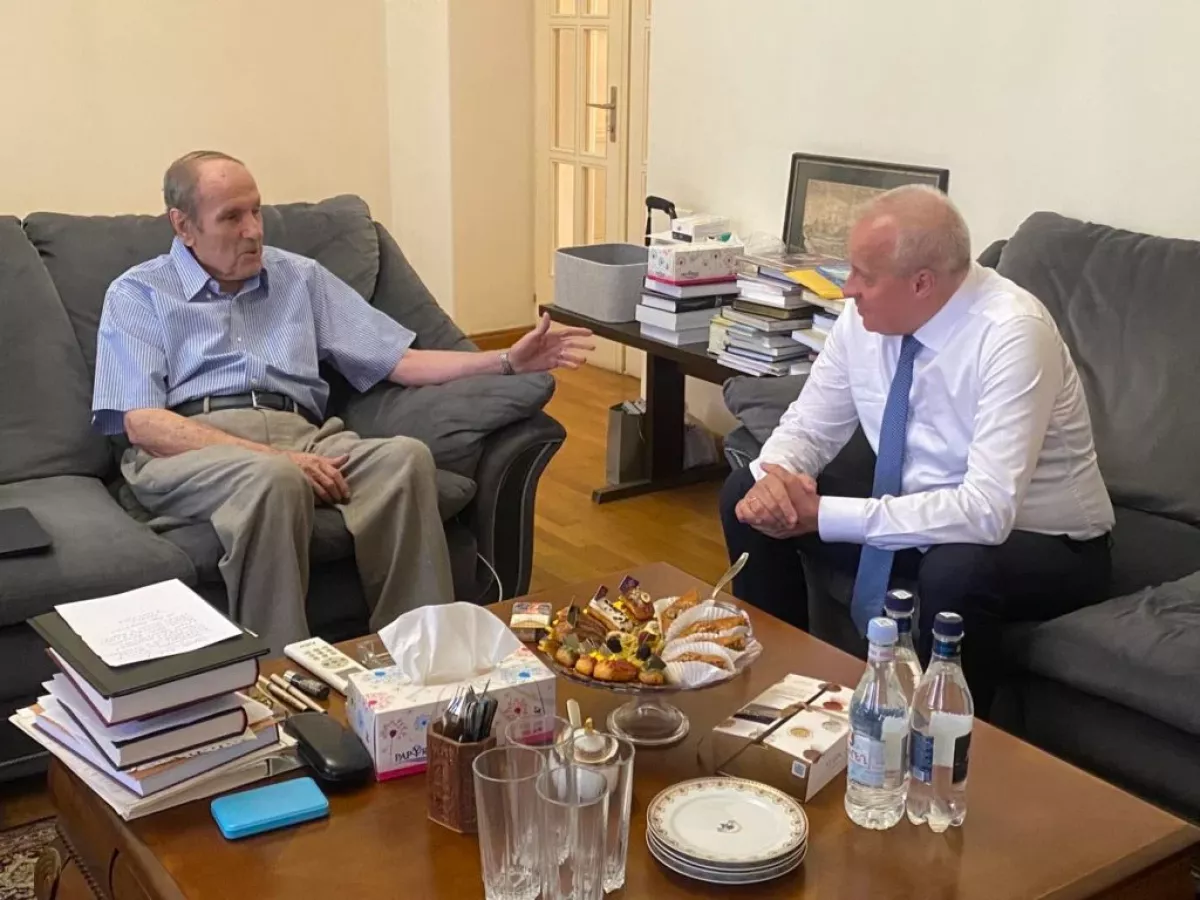Armenia’s old elites against peace with Baku Ex-president dreams of revenge
Amid historic achievements in establishing peace between Armenia and Azerbaijan, the result of Baku’s deliberate policy and high-level meetings in Washington, the perennial opponents of Prime Minister Nikol Pashinyan have noticeably become more active. Recently, the first President of Armenia, Levon Ter-Petrosyan, has repeatedly distinguished himself with provocative statements directed at the current government.
Earlier, he criticised the Prime Minister, who had addressed the nation with a call for peace.
“Armenia’s Prime Minister Nikol Pashinyan is the main factor destabilising domestic political life; he pursues a policy aimed not at consolidating the people but at dividing society,” Ter-Petrosyan said at the time.
The first president’s attacks did not go unnoticed—Nikol Pashinyan, in turn, accused him of consistently fleeing political responsibility.
“In 1996, you fled the results of the elections; in 1998, from power; in 2008, from the opposition. I understand that now you want to run again, but you cannot find where. And you don’t need to: just calm down and enjoy the peaceful life that has been established in the Republic of Armenia,” the Prime Minister wrote on social media.
In principle, it is absolutely clear that such attacks from Pashinyan’s political opponents will occur regularly and will only intensify ahead of the upcoming parliamentary elections and constitutional referendum in June 2026. However, we now want to focus on yet another bow from the ex-president towards Russia.
Levon Ter-Petrosyan, during a conversation with the Russian Ambassador to Armenia, Sergey Kopyrkin, stated that “the presence of Russia in the South Caucasus is a pressing necessity and a reality confirmed by history.” During the discussion, he also took the opportunity to note that, allegedly, “honest and reliable friends of Armenia are Russia, Iran, Georgia, France, Greece, and in the near future — China and India.”

From these statements, it is clear that the ex-president’s previous position on the necessity of a Russian presence in Armenia has not changed. For example, in June 2011, in an interview with Moskovskiye Novosti (Moscow News), he fervently argued that “the only player in the South Caucasus is Russia.”
Back in the 1990s, in an interview with Kommersant, he stated that “without Russia, Armenia would not survive even a month.” In other words, Ter-Petrosyan publicly denied Armenia’s independence, effectively acknowledging the country as a vassal of Russia—which, in principle, corresponded to reality. At the time, Moscow supported Armenia’s struggling economy by all means, supplying Russian gas at preferential prices, and providing weapons that were used against Azerbaijan.
It was precisely during Levon Ter-Petrosyan’s presidency that, with Russia’s tacit consent, Armenian armed forces occupied Azerbaijani territories and carried out the Khojaly genocide, violating all norms and principles of international law as well as the moral and ethical values of civilisation.
At the time, addressing Armenian militants about the “cleansing of Karabakh,” the first President of Armenia personally admitted to the forced expulsion of Azerbaijanis from the region. “We cleansed Armenia of Azerbaijanis, we cleansed Artsakh. You did what the Armenian people could not achieve in the last 600 years. We cleansed Armenia of Azerbaijanis because they hindered us from achieving our goals. 170,000 Azerbaijanis formed the majority in three districts. There were also many along Zangezur. If we had not cleansed them, we would have faced problems in these districts as soon as the USSR collapsed,” boasted Ter-Petrosyan about his “achievements.”
Today, we are witnessing how the ex-president is attempting by all possible means to obstruct the establishment of peace in the region, even after a peace agreement between the two countries was initialled in Washington in the presence of the leaders of Azerbaijan and Armenia, as well as the President of the United States.
Regarding his conversation with the Russian ambassador, Ter-Petrosyan effectively sent an explicit message that Armenian revanchists are counting on direct Russian intervention in the country’s upcoming political processes. In other words, it is a signal to Moscow that there are forces in Armenia aiming to remove Nikol Pashinyan from power, but without external assistance this cannot be achieved, as the Prime Minister’s policies are supported by the majority of civil society. For this reason, Ter-Petrosyan is once again trying to convince Armenians that their salvation lies with Russia, rather than in normalising relations with their regional neighbours.
It is also clear from the ex-president’s statements that, aside from Russia, the Armenian opposition is counting on support from Iran, which, to put it mildly, is not enthusiastic about the prospect of implementing the Zangezur corridor under U.S. patronage.
In conclusion, the following can be inferred: at present, there are real conditions for the opposition, including with the involvement of former Armenian presidents, to once again attempt to destabilise the country’s domestic political situation. It is entirely possible that, in the period remaining before the parliamentary elections in Armenia, Moscow could “lend a hand” in organising a “colour revolution” in Yerevan.
This scenario serves as a signal to Armenian society about the necessity of consolidating around the current Prime Minister in order to translate the achieved results in establishing regional peace into a practical reality. The Armenian people have no other choice, because otherwise the revanchist opposition will once again restore Armenia’s status as a regional outpost.








